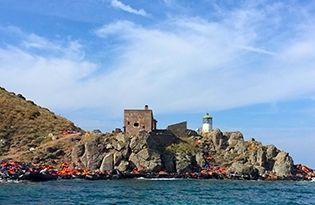Thinking Anglicans reports on the recent meeting of the World Council of Churches in Munich, which discussed the current refugee crisis in Europe. After the meeting, the ACNS reports
The suffragan bishop in Europe, the Rt Revd Dr David Hamid, has joined other bishops and church leaders from a number of denominations in calling for safe passage to those seeking refuge.
The recommendation is one of a number contained in a communiqué issued following a church leaders’ consultation in the German city of Munich.
The church leaders recognise that “there are no quick solutions” to the crisis and they are urging political leaders to “acknowledge that persistent, consistent long-term efforts are needed” and to “refrain from any exploitation of this human crisis for political ambition or benefit.”
They say that the churches “wish to accompany our governments in seeking . . . sustainable solutions” to the crisis and urge politicians “not to let . . . fears shape their policy.
Bishop Hamid, from the Church of England, was one of 35 Protestant, Anglican, Orthodox and Roman Catholic leaders who attended the consultation, representing churches in the most affected regions from most of the church families in Europe.
Thinking Anglicans highlights one direct action response via Us, formerly USPG, the Anglican mission agency in Europe, along with the Diocese in Europe.
The refugees arrive cold and wet having crossed 15 kilometres from Turkey, typically making the journey in small rubber boats crowded with up to 50 people in each.
Many make this dangerous crossing at night to avoid the Turkish coastguards that patrol during the day.
They come mostly from Syria, Iraq and Afghanistan having fled conflict, chaos and persecution in those countries.
Attracted by the lighthouse beam, the refugees that land on the rocky shore are soaked through, tired and hungry. Yet they are still six kilometres from the nearest village, Klio, which is a minimum six-hour walk across often-difficult terrain.
It is therefore essential for the health of the refugees that they have dry clothes, food and, in many cases, medical care and shelter before they continue their journey to safety, preferably with a volunteer to act as a guide.
A dedicated team of local volunteers have been doing what they can to help the refugees. Now the work is to be given a further boost with funding from Us and support from the Anglican chaplaincy in Greece. …
As well as providing refugees with food, clothing and medicines, volunteers will be supplied with ropes to help refugees climb up the rocky shores, and safety helmets and headgear for children and babies. There is also a need for wetsuits, night vision binoculars, heaters, lighting and walky-talkies.
Bishop David Hamid, of the Diocese in Europe, said: ‘I am deeply grateful for our partnership with Us in this project, which in many ways is reviving a historic link between Us and our European churches.
‘The Anglican Church in Greece is joining hands with Us to serve those who are fleeing wars and persecution, and who risk their lives in desperation to reach Europe in what many have called “the death boats”.
‘This project places our church on the frontline where so many have already died through drowning, and seeks to bring a level of human dignity to our brothers and sisters who are seeking refuge and safety.’
The agencies will use empty buildings adjacent to the lighthouse to welcome and assist refugees arriving on the Greek island of Lesvos. They are launching an Advent appeal to support their efforts.
Find all the links and more about the Munich meeting at the Thinking Anglicans website, here.
Photo: Pharos lighthouse, via Us

